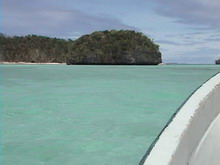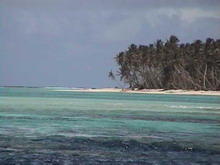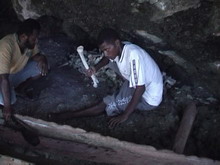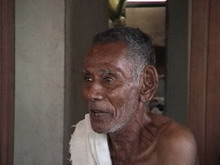
On my first visit to Fiji, some Fijians took me to a choir competition at a small church far from the resort where I was staying. Amidst the world's loveliest choir voices, I heard someone behind me chewing gum loudly and annoyingly.
I turned around and gave the kind of look that in America would mean, "Hey, cut it out." The person doing the chomping was a big-smiled Fijian boy of about ten. He just smiled more broadly at me - and chomped more loudly. As a new choir was getting ready, I asked the kid, "What flavor is that gum?" hoping he'd realize that his gum was on my mind. It didn't work. He replied with an even bigger grin: "No flavor; the flavor was all gone many hours back." No shit, I thought.
Realizing he'd be chewing it for many hours more, I said to myself, "Man, you're in a church in Fiji; if ever there was a time to pray to have your edginess at annoying noises lifted, this is the time."
During the next break, I asked the kid, "Is that gum fish flavor?" and he thought that was the funniest thing he'd ever heard. At the next break, he tapped me on the shoulder and said, "Ask me another one."
And so it went that whenever the choirs were between songs, this boy (whose name was Paola) would tap me on the shoulder and ask for another joke. When I ran out of humor about the gum-chewing noises, the boy, whose name was Paola, asked, "Do you want to hear a legend?" He proceeded to tell me a long, sort of confusing story about bamboo. (The ending was clear: "...and that's how God brought bamboo to earth.")
He said he wanted to be a doctor and when I asked why, he thought for a moment and gazed off into the distance with a serious look: "To make the people of my village healthy and happy."
At the end of the choir competition he introduced me to his family and they invited me to return to the village on Sunday and go to church with them. I said I would, but I sort of knew I would not. On Sunday morning, when I first woke up, I remembered the invitation. Though feeling a bit shitty about letting them down, I was traveling to LA that afternoon, and staying in bed was more attractive than a taxi ride across the island. Predictably unable to sleep, I tossed and cursed, and then got a damn taxi.
After a bumpy hour-long ride, I arrived at the village too late; church was over, everyone was gone. As the taxi was turning around to take me back, I looked up at the church and saw one little black natural pop up in a window. Paola. He'd fallen asleep on a bench while waiting for me. He ran out of the church, across the village green and called out, "I knew you'd be here."
I spent some time with this bright energy, answering his questions about doctors and science. I gave him a small medical computer (where one can look up words, like a spellchecker), then said hello and goodbye to his family, and headed back to the resort, likely never to see Paola again. And since then, whenever I hear gum-chewing, it recalls Paola to mind, and it bugs me not.
The experience of the kind, bright energy of that boy and his family was among the reasons I started visiting Fiji more often, and among the reasons I eventually built a home here.
Fade out many years: Houseguests from America had just left and I'd asked all staff to go home early so I could have the whole place to myself. While reading quietly on a deck above the ocean, I was startled to see a man standing just a few feet away, facing me. Whoever he was, he didn't belong there, and he was interrupting my peaceful afternoon. I said "Baleta lako mai?" (broken Fijian for "Why'd you come here?").
With a broad smile, he said, "Don't you remember me?"
It was Paola, now 18 years old and six feet tall.
He couldn't stop beaming and telling me about his life, and about how much I'd encouraged him to study hard toward being a doctor, etc. And I said, "Really?" and he looked off into the distance seriously and said, "Truly."
Paola started visiting on Saturdays to do his homework and reading here at Naqaqa, and I found him to be a terrific person. Laughing, positive outlook, a young man with the same core as the boy I'd met year ago.
I asked the doctor who runs a private clinic in town to employ Paola. I'd pay his salary as a way to help Paola learn about medicine, and a way to help the doctor. After I was injured in the cyclone, when I visited the clinic to have bandages changed, the nurse called for her assistant, and I got the reward of watching Paola enter the room.
Then I learned that Paola had met his 84-year old grandfather just once as a small boy. "I don't remember his face, and I'll probably never see him." His grandfather lives on the remote island of Yacata, where Paola's father was born, but which Paola had never visited - and which would not be easy for him to reach.
I offered to take Paola and his father there. A week later, we set out for a plane ride (Paola’s first), a crossing by small boat through rough seas (my first), a trip on a very small boat, and a wade to shore through calm, warm waters.
The longest segment of the day-long trip was across hours of open ocean, a trip that started with lots of laughing as each swell raised and lowered the boat like a gentle Disneyland ride. Within thirty minutes, it had become the kind of theme park ride that would stimulate lots of lawsuits, the boat arching up the front of each huge wave, and dropping with a hard crash on the other side. We managed a few laughs at each other’s stumbling, but mostly just held on and grimaced.
The boat I had hired was a 40-foot twin-engine with a small cabin you couldn’t even consider entering because you’d risk losing a tooth as the sea battered the aluminum hull. Paola’s father is 62 years old, has diabetes, and doesn’t walk that well, and I was concerned that the crossing was a bit rough for him. At the peak of our thrashing by the waves, when each of us was acquiring new bruises and aches by the second, Paola’s father said enthusiastically, “This is was the best crossing I’ve ever had!” He told of making the trip when he was a boy and teenager - in little open boats that would try for hours, then turn back, only to repeat the failed attempt two or three days in a row.
When we were officially in the middle of nowhere, the captain pointed out a little lump of land in the distance: Yacata Island.
I had no idea what to expect, but our gradual advance revealed a lush island shaped like a cowboy hat, with the center a giant volcanic mountain, and the brim made of the whitest sandy beaches I’ve ever seen.
As we approached the island of birth for his father, and ancestors probably going back more than a thousand years, Paola was wide eyed. He (and I) had never seen pastel blue water laid out for miles. In the photos I took, the color of the ocean looks doctored.
We waded to shore at the small village, and made our way to Paola’s grandfather’s house. Nobody had any idea we were coming (no phone on the island, no electricity, no working postal system), and the old man was profoundly shocked to see his son and meet his grandson. He must have said ten times, “I never expected to see you.” He kissed Paola, and then sat down on the floor to just look at him. The conversation was mostly about how nobody ever expected to see each other (true for me too, I guess), but after an hour or so, Paola’s father and grandfather spoke so casually that you’d never imagine the conversation had been interrupted by years.
We were served lunch, and then told to go take a nap – welcome words I wish all hosts would utter to visitors who’ve traveled far. The next event would be an official “sevusevu” ceremony to introduce Paola to the Chief and ask him to accept him as a rightful member of the village. It was more than mere tradition, for if accepted, Paola would be an instant landowner, able to choose a parcel and build a home at any time in his life.
We were taken to the Chief’s house, where we sat on the floor in a circle. Paola’s father presented a whale’s tooth, the item of highest value in Fijian culture. Paola presented the root of a kava plant. Lots of talking, responding, and clapping with cupped hands, a prayer at the end, and a formal pronouncement that Paola was accepted. The Chief also granted me permission to go anywhere on the island.
As we left the ceremony, the 19-year old Paola now owned (with about 20 others in his clan) 1500 acres of some of the world’s most beautiful land. We toured lush pristine beaches with small offshore islands, some of them just a hundred feet across – but a hundred feet of pure white sand. If there were a resort in a place like this, it would be among the most impressive in the world. Without a resort, it’s even more impressive.
Paola told me that he’d always been ashamed when people asked him where he hailed from, and he had to admit he’d never seen his home village or island. He said he now knew that whatever happened in his life, he could always return there.
This was profound to me, as my family never owned a home, and more importantly, few of us in America or at our age have family homes where relatives still live, places we visit at holidays, places we know we could stumble back to if wounded by life’s battles.
How kind of Fijian culture to provide a home for every indigenous Fijian. What a comfort in life.
The next morning, I took a walk on one of Paola’s beaches, miles long. Out on the reef, several people were fishing for lunch. Fish are so plentiful on this reef (and people so few) that islanders go for a half-hour or so and catch what they need for the next meal. All these folks would be back in the late afternoon to catch dinner. In the distance, I saw a young man walking down the beach in my direction, his right hand holding a bunch of fish he’d just caught. As he spotted me, clearly a stranger, he made a small gesture so characteristic of Fiji: He switched the fish to his left hand so he could shake hands when we met. There is no chance that two people walking toward each other would just pass. In fact, passing people isn’t something you do much in Fiji. You stop, greet, talk, pause, maybe sit down for a while and talk some more, then say goodbye with some plan that you’ll see each other again.
Lunch on the second day was freshly picked vegetables and fresh catch (the only thing ever on the menu, given that there's no refrigeration). After a nap and a swim, Paola told me that his father and others recommended we hike up the mountain to see the land from there, and also visit a special cave that is central to the island’s history.
An islander named Matai volunteered to be our guide, and we began what Fijians (who have no conception of time or distance) describe as an easy trip, the kind of trip they make every day to care for crops or pick fruit, the kind of trip that takes an old white guy with an injured foot almost four hours and 25 rest-stops. Thank God for sugar cane (I devoured four stalks); thank God for coconuts (I drank many coconuts-full of water); thank God for bananas (ate a bunch) – and most of all, thank God for people who know how to use a machete, and were happy to keep my blood-sugar high in the tropical sun.
On the way up to the cave, Matai told of how his ancestors had defended the island against Tongan invaders more than 250 years ago. His ancestors had determined to engage the enemy in the ocean rather than fight on land, where the giant Tongans would be hard to defeat. That plan worked, and the islanders made the Tongan invaders load their dead into their giant canoe and carry it up the mountain along the same path we were hiking. The trip that took us half a day took the Tongans several weeks – though knowing their fate at the top of the hill, they were probably in no rush.
Matai told us with pride that we’d see the relic of the canoe, but we were less prepared for the rest of what we saw when we reached the cave. Skulls, giant jaws, and bones were piled up ceremonially alongside what was left of the canoe. The islanders had not only forced the Tongans to carry their dead up the hill, but -still living in the days of cannibalism- the Fijians had eaten all of them… right where we stood. Each skull had a huge hole in its side through which the brain (predictably, the favored delicacy) was removed.
Back at the grandfather’s house, boyhood friends of Paola’s father visited, joked around in that way that old friends do, breaking into laughter as each old story was recalled. But they also fell into occasional silences, eyes thick with tears – like old friends do.
Paola was a celebrity, particularly to the kids on the island (some of whom really resemble him), and by the next morning when he and his father left, seemingly the whole village turned out on the beach to say goodbye. As we headed out to sea, Paola imagined returning someday to build a house on one of the beaches. At the same time, Paola’s father, knowing he’d likely never return, silently watched the people keep waving until the shoreline was out of sight.
Paola's grandfather died twelve weeks later.





